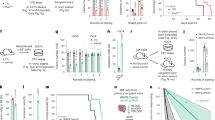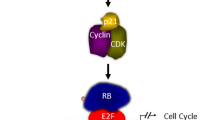Abstract
Retinoic acid receptor alpha (RARα) has a critical role in the differentiation process of osteosarcoma cells induced by all-trans retinoic acid (ATRA). However, degradation of RARα through ubiquitin proteasome pathway weakens the differentiation efficiency of osteosarcoma cells. In this study, we discover that murine double minute-2 (MDM2) acts as an E3 ubiquitin ligase to target RARα for degradation. We observe that MDM2 is required for RARα polyubiquitination and proteasomal degradation because downregulation of MDM2 by short hairpin RNA results in the accumulation of RARα, and MDM2 overexpression promotes the degradation of RARα. We also demonstrate that the N-terminal domain of MDM2 (amino acids 1–109) is the major RARα-binding site. Importantly, endogenous MDM2 levels are not only upregulated in human primary osteosarcoma blasts but are also inversely correlated with the level of osteopontin, which is a marker of bone differentiation. Moreover, MDM2 impairs the ATRA-induced osteoblastic differentiation of osteosarcoma cells, whereas an inhibitor of the MDM2 ubiquitin ligase synergizes with ATRA to enhance the differentiation of osteosarcoma cells and primary osteosarcoma blasts. Therefore, our study indicates that MDM2 serves as an E3 ubiquitin ligase to regulate the degradation of RARα and suggests that MDM2 is a novel therapeutic target for ATRA-based differentiation therapeutic approaches in osteosarcoma.
This is a preview of subscription content, access via your institution
Access options
Subscribe to this journal
Receive 50 print issues and online access
$259.00 per year
only $5.18 per issue
Buy this article
- Purchase on Springer Link
- Instant access to full article PDF
Prices may be subject to local taxes which are calculated during checkout







Similar content being viewed by others
Abbreviations
- ALP:
-
alkaline phosphatase
- ATRA:
-
all-trans retinoic acid
- OPN:
-
osteopontin
- RARα:
-
retinoic acid receptor alpha
- RUNX2:
-
runt-related transcription factor 2.
References
Niederreither K, Dolle P . Retinoic acid in development: towards an integrated view. Nat Rev Genet 2008; 9: 541–553.
Hisada K, Hata K, Ichida F, Matsubara T, Orimo H, Nakano T et al. Retinoic acid regulates commitment of undifferentiated mesenchymal stem cells into osteoblasts and adipocytes. J Bone Miner Metab 2013; 31: 53–63.
Dingwall M, Marchildon F, Gunanayagam A, Louis CS, Wiper-Bergeron N . Retinoic acid-induced Smad3 expression is required for the induction of osteoblastogenesis of mesenchymal stem cells. Differentiation 2011; 82: 57–65.
Luo P, Yang X, Ying M, Chaudhry P, Wang A, Shimada H et al. Retinoid-suppressed phosphorylation of RARalpha mediates the differentiation pathway of osteosarcoma cells. Oncogene 2010; 29: 2772–2783.
Haydon RC, Zhou L, Feng T, Breyer B, Cheng H, Jiang W et al. Nuclear receptor agonists as potential differentiation therapy agents for human osteosarcoma. Clin Cancer Res 2002; 8: 1288–1294.
Haydon RC, Luu HH, He TC . Osteosarcoma and osteoblastic differentiation: a new perspective on oncogenesis. Clin Orthop Relat Res 2007; 454: 237–246.
Dilworth FJ, Chambon P . Nuclear receptors coordinate the activities of chromatin remodeling complexes and coactivators to facilitate initiation of transcription. Oncogene 2001; 20: 3047–3054.
He BC, Chen L, Zuo GW, Zhang W, Bi Y, Huang J et al. Synergistic antitumor effect of the activated PPARgamma and retinoid receptors on human osteosarcoma. Clin Cancer Res 2010; 16: 2235–2245.
Zhang L, Zhou Q, Zhang N, Li W, Ying M, Ding W et al. E2F1 impairs all-trans retinoic acid-induced osteogenic differentiation of osteosarcoma via promoting ubiquitination-mediated degradation of RARalpha. Cell Cycle 2014; 13: 1277–1287.
Ying M, Zhou X, Zhong L, Lin N, Jing H, Luo P et al. Bortezomib sensitizes human acute myeloid leukemia cells to all-trans-retinoic acid-induced differentiation by modifying the RARalpha/STAT1 axis. Mol Cancer Ther 2013; 12: 195–206.
Zhu J, Gianni M, Kopf E, Honore N, Chelbi-Alix M, Koken M et al. Retinoic acid induces proteasome-dependent degradation of retinoic acid receptor alpha (RARalpha) and oncogenic RARalpha fusion proteins. Proc Natl Acad Sci USA 1999; 96: 14807–14812.
Ladanyi M, Cha C, Lewis R, Jhanwar SC, Huvos AG, Healey JH . MDM2 gene amplification in metastatic osteosarcoma. Cancer Res 1993; 53: 16–18.
Momand J, Jung D, Wilczynski S, Niland J . The MDM2 gene amplification database. Nucleic Acids Res 1998; 26: 3453–3459.
Honda R, Tanaka H, Yasuda H . Oncoprotein MDM2 is a ubiquitin ligase E3 for tumor suppressor p53. FEBS Lett 1997; 420: 25–27.
Wallace M, Worrall E, Pettersson S, Hupp TR, Ball KL . Dual-site regulation of MDM2 E3-ubiquitin ligase activity. Mol Cell 2006; 23: 251–263.
Lin HK, Wang L, Hu YC, Altuwaijri S, Chang C . Phosphorylation-dependent ubiquitylation and degradation of androgen receptor by Akt require Mdm2 E3 ligase. EMBO J 2002; 21: 4037–4048.
Pan Y, Chen J . MDM2 promotes ubiquitination and degradation of MDMX. Mol Cell Biol 2003; 23: 5113–5121.
Weber JD, Kuo ML, Bothner B, DiGiammarino EL, Kriwacki RW, Roussel MF et al. Cooperative signals governing ARF-mdm2 interaction and nucleolar localization of the complex. Mol Cell Biol 2000; 20: 2517–2528.
Mayo LD, Dixon JE, Durden DL, Tonks NK, Donner DB . PTEN protects p53 from Mdm2 and sensitizes cancer cells to chemotherapy. J Biol Chem 2002; 277: 5484–5489.
Sdek P, Ying H, Chang DL, Qiu W, Zheng H, Touitou R et al. MDM2 promotes proteasome-dependent ubiquitin-independent degradation of retinoblastoma protein. Mol Cell 2005; 20: 699–708.
Florenes VA, Maelandsmo GM, Forus A, Andreassen A, Myklebost O, Fodstad O . MDM2 gene amplification and transcript levels in human sarcomas: relationship to TP53 gene status. J Natl Cancer Inst 1994; 86: 1297–1302.
Berner JM, Forus A, Elkahloun A, Meltzer PS, Fodstad O, Myklebost O . Separate amplified regions encompassing CDK4 and MDM2 in human sarcomas. Genes Chromosomes Cancer 1996; 17: 254–259.
Freemantle SJ, Spinella MJ, Dmitrovsky E . Retinoids in cancer therapy and chemoprevention: promise meets resistance. Oncogene 2003; 22: 7305–7315.
Fang S, Jensen JP, Ludwig RL, Vousden KH, Weissman AM . Mdm2 is a RING finger-dependent ubiquitin protein ligase for itself and p53. J Biol Chem 2000; 275: 8945–8951.
Zhan C, Varney K, Yuan W, Zhao L, Lu W . Interrogation of MDM2 phosphorylation in p53 activation using native chemical ligation: the functional role of Ser17 phosphorylation in MDM2 reexamined. J Am Chem Soc 2012; 134: 6855–6864.
Vassilev LT, Vu BT, Graves B, Carvajal D, Podlaski F, Filipovic Z et al. In vivo activation of the p53 pathway by small-molecule antagonists of MDM2. Science 2004; 303: 844–848.
Poyurovsky MV, Katz C, Laptenko O, Beckerman R, Lokshin M, Ahn J et al. The C terminus of p53 binds the N-terminal domain of MDM2. Nat Struct Mol Biol 2010; 17: 982–989.
Wang W, Hu Y . Small molecule agents targeting the p53-MDM2 pathway for cancer therapy. Med Res Rev 2012; 32: 1159–1196.
Zhou Q, Zhang L, Chen Z, Zhao P, Ma Y, Yang B et al. Small ubiquitin-related modifier-1 modification regulates all-trans-retinoic acid-induced differentiation via stabilization of retinoic acid receptor alpha. FEBS J 2014; 281: 3032–3047.
Gianni M, Boldetti A, Guarnaccia V, Rambaldi A, Parrella E, Raska I Jr et al. Inhibition of the peptidyl-prolyl-isomerase Pin1 enhances the responses of acute myeloid leukemia cells to retinoic acid via stabilization of RARalpha and PML-RARalpha. Cancer Res 2009; 69: 1016–1026.
Chai Z, Yang L, Yu B, He Q, Li WI, Zhou R et al. p38 mitogen-activated protein kinase-dependent regulation of SRC-3 and involvement in retinoic acid receptor alpha signaling in embryonic cortical neurons. IUBMB Life 2009; 61: 670–678.
McCoy MA, Gesell JJ, Senior MM, Wyss DF . Flexible lid to the p53-binding domain of human Mdm2: implications for p53 regulation. Proc Natl Acad Sci USA 2003; 100: 1645–1648.
Vassilev LT . MDM2 inhibitors for cancer therapy. Trends Mol Med 2007; 13: 23–31.
Steinman HA, Burstein E, Lengner C, Gosselin J, Pihan G, Duckett CS et al. An alternative splice form of Mdm2 induces p53-independent cell growth and tumorigenesis. J Biol Chem 2004; 279: 4877–4886.
Zhang Z, Zhang R . p53-independent activities of MDM2 and their relevance to cancer therapy. Curr Cancer Drug Targets 2005; 5: 9–20.
Barak Y, Juven T, Haffner R, Oren M . mdm2 expression is induced by wild type p53 activity. EMBO J 1993; 12: 461–468.
Trotta R, Vignudelli T, Candini O, Intine RV, Pecorari L, Guerzoni C et al. BCR/ABL activates mdm2 mRNA translation via the La antigen. Cancer Cell 2003; 3: 145–160.
Moumen A, Patane S, Porras A, Dono R, Maina F . Met acts on Mdm2 via mTOR to signal cell survival during development. Development 2007; 134: 1443–1451.
Xiong L, Kou F, Yang Y, Wu J . A novel role for IGF-1R in p53-mediated apoptosis through translational modulation of the p53-Mdm2 feedback loop. J Cell Biol 2007; 178: 995–1007.
Acknowledgements
This work was supported by grants from the National Natural Science Foundation of China (Nos. 81473227, 91029745 and 81273536), Zhejiang Provincial Program for Qianjiang Talents (2013R10025), Zhejiang Provincial Natural Science Foundation of China (No. Y14H160124) and the Fundamental Research Funds for the Central Universities.
Author information
Authors and Affiliations
Corresponding author
Ethics declarations
Competing interests
The authors declare no conflict of interest.
Additional information
Supplementary Information accompanies this paper on the Oncogene website
Rights and permissions
About this article
Cite this article
Ying, M., Zhang, L., Zhou, Q. et al. The E3 ubiquitin protein ligase MDM2 dictates all-trans retinoic acid-induced osteoblastic differentiation of osteosarcoma cells by modulating the degradation of RARα. Oncogene 35, 4358–4367 (2016). https://doi.org/10.1038/onc.2015.503
Received:
Revised:
Accepted:
Published:
Issue Date:
DOI: https://doi.org/10.1038/onc.2015.503
This article is cited by
-
First in class dual MDM2/MDMX inhibitor ALRN-6924 enhances antitumor efficacy of chemotherapy in TP53 wild-type hormone receptor-positive breast cancer models
Breast Cancer Research (2021)
-
Inhibition of M2-like macrophages by all-trans retinoic acid prevents cancer initiation and stemness in osteosarcoma cells
Acta Pharmacologica Sinica (2019)
-
F-box protein FBXO30 mediates retinoic acid receptor γ ubiquitination and regulates BMP signaling in neural tube defects
Cell Death & Disease (2019)



